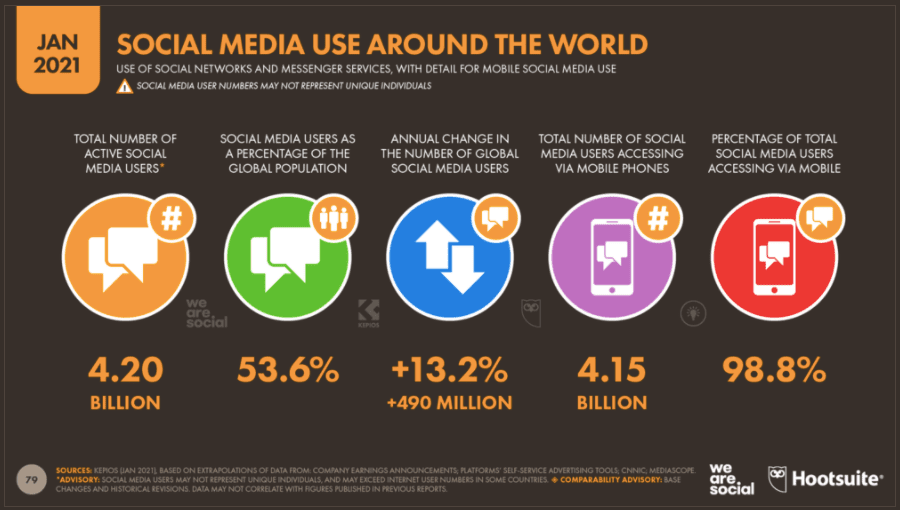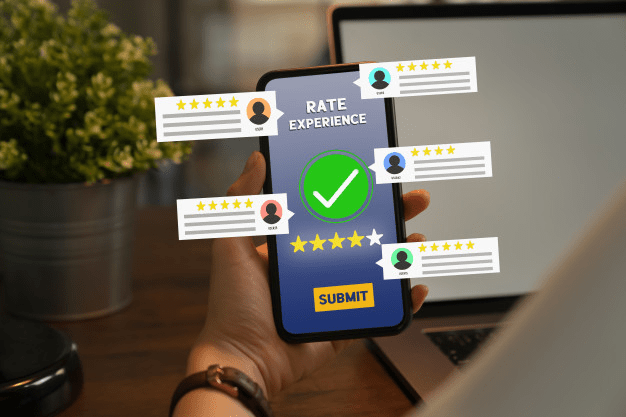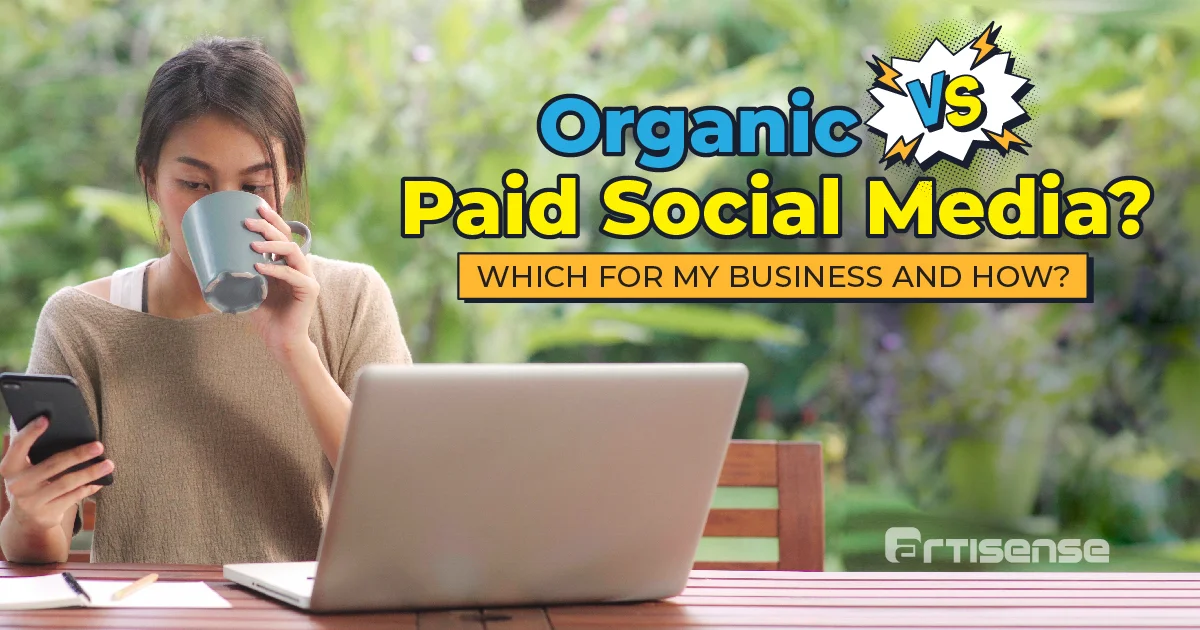In present times, business and social media are no longer two separate entities. These two are very much intertwined – social media allows for marketing, boosting brand awareness, and increasing engagement, which affords business owners a great deal of customers with the proper execution.
Only thing is, how exactly does one go about handling social media for their business? Content worries aside, what is the right approach to consider in the first place? The organic way of posting for free might not cost anything, but perhaps paid social media advertising is just worth more of the effort in the long run. It can be confusing to decide which one’s better.
If you’re caught in this organic VS paid social media dilemma, you’ve come to the right place! With both having their differences, read on to see which type of social media is better for your business and how you can go about starting!
Social media matters a lot for businesses

These days, social media is a major driving force in influencing consumer purchasing behavior. Statistics show that as many as 74% of consumers rely on social networks for making their purchasing decisions. Plus, even back in 2012, as many as 78% of customers’ purchasing decisions were influenced by companies’ social media posts. Now, that’s a lot of customers!
It’s safe to assume that the numbers have gone up since then, which means social media is a huge influence on a lot of customers out there. With that being said, social media can be approached in two ways – organic and paid – both of which can be equally effective. Let’s take a look at the differences of organic VS paid social media:
Organic Social Media

In the simplest sense, organic social media is the use of social media without any form of paid promotion. This approach utilizes the free tools and services that social media platforms provide to build up your brand, meaning there’s no money involved in the posting of content. For instance, a video or image post on your page without any money paid to “boost” it would be an organic post.
Focusing on authentic posts and content, organic social media has its own number of pros in business use. Some of them are as follows:
Pros:
- Free content
Whether it’s status updates, photos, images, videos, podcasts, testimonies, or memes, organic social media content can be created just by using free services and tools.
- Perfect for building your own loyal community
Unlike advertisements, relevant content that people can relate to is the cornerstone of organic social media. This emphasis on good content makes it easier for audiences to trust you and lets you nurture real connections with your customers better.
- Establishes your brand personality & voice
The content-focused nature of organic social media makes it a great way for you to communicate a brand’s personality, values, and voice in your posts, allowing your audiences to better identify and see what your brand stands for.
- Builds relationships through quality, shareable, informative content
Quality content is a big part of organic social media, and these are able to spread around faster and reach more people. Whether it’s valuable tips, relevant trendy topics, or even entertaining stories, these types of content are great for encouraging people to share your page, and this can help you gain more visibility in their circle of friends for more reach.
- Leverages user-generated content
In practice, user-generated content (UGC) is powerful in convincing customers of the legitimacy of your products and services. Many consumers pay more attention to authentic experiences by the community nowadays, and UGC can act as an authentic and effective “social proof” in attracting your targeted customers.

With the right content and activity on social media, almost any brand can successfully grow with organic social media.
For instance, local cinema GSC is renowned by followers for their admin’s cheeky persona, famous “Hello. Cannot” tagline, and amusing interactions with local brands on Facebook. Besides that, the popular “Eat Pray Love” Facebook page has gained many loyal followers and a high number of shares by promoting delicacies in Malaysia and sharing cooking tips. All of their popularity is thanks to none other than organic social media content.
Even so, organic social media is not without its flaws either. Some cons to take note of are:
- Requires more time and effort to truly shine
Organic social media can be effectively thought of as doing it “the old-fashioned way”. Without any paid forms of help or promotion for your posts, it can take some time and effort before organic social media starts to produce some successful results.
- Difficult to determine whether your audience resonates with your content
The success of organic social media is tied to the quality of your content and how well your audience receives them. This can make it hard to gauge how much the audience will resonate with your content, especially if you’re just starting out on a new page.
Despite these shortcomings, organic social media is nevertheless a solid way to boost validity and authenticity that every brand should use these days. After all, a brand needs a good, lively personality if it wants to attract customers, and what better way than through engaging content?
Paid Social Media

As its name implies, paid social media is when brands pay social media platforms to have their content, messages, or ads displayed to other audiences besides their followers. Paid social media advertising makes use of sponsored posts and advertisements that target new audiences to convert them to customers.
In contrast with organic social media, paid social media advertising is more promotion-oriented in helping brands to generate leads and attract new customers. This does come with some advantages:
Pros:
- Higher reach than organic social media
Over the years, the reach of organic social media is continuing to plummet, which makes it harder for brands to grow organically. Statistically, a Facebook post has an average organic reach of only 5.17% of a page’s likes in year 2020. The numbers don’t lie, paying gets you more reach!
- Helps spread content that converts
Think about it, you’ve invested a lot of time and effort in creating content that can convert, why not spend some money in helping spread it around? The higher reach afforded by paid social media can ensure that your content doesn’t go to waste.
- Reaches your ideal target audience
By using paid social media, this allows your content to better reach your specific ideal audiences through targeting. In effect, paid social media advertising allows brands to target audiences in different ways, such as geographical targeting that focuses on customers who are nearer to your store, letting you get more quality customers.
- Lets you get ahead of competitors without paid social media
Social media is becoming increasingly pay-to-play nowadays. Statistically, as many as 84% of content marketers use paid distribution channels, and this mainly includes paid social media advertising. This means that brands with paid social media now have an advantage over those without it when it comes to reaching customers.
- Collects customer data faster
Compared to organic social media, paid social media allows brands to collect customer data more quickly and accurately thanks to a wider range of analytics. This extra information is quite beneficial in helping brands make informed marketing decisions in the future.

Overall, paying for social media affords brands extra reach, audience targeting, and collection of customer data. Although there is the cost, spending that first sum of money on social media can be all it takes to get a brand going.
Take Oxwhite, for example, a local apparel brand that started from humble origins to become a successful brand. With the odds initially against them, they did it all thanks to online marketing, particularly through extensive social media advertising.
Even so, paid social media does have its drawbacks as well. The two most notable ones are:
- Need for allocating budget
If it wasn’t obvious enough, paid social media advertising comes with a price. Depending on the scale of your business and your social media strategy, the costs can be fairly high, and this can prove less favourable to businesses with lesser money to spare.
- Requires specific skill set in marketing
Properly utilizing social media for business can be tricky, especially if you plan to do it on your own. Planning, strategizing, remarketing… getting good results won’t be easy unless you work with a specialized agency, like Artisense! Having a professional team behind you can help you maximize every cent you spend on marketing.
For most businesses, going for the paid social media route can be well worth the money in reaching your audiences. Although there is the initial cost, marketing with paid social media can help ensure better chances of your business doing well on social media, especially with certain changes in algorithm making pay-to-play more or less a necessity for social media now.
Is it possible to employ both?

You most certainly can! It’s not a necessity to pick a side in the organic VS paid social media debate as a hybrid strategy that utilizes both organic and paid is arguably the best approach in most cases.
By making use of both, lets you strike a balance between the content-focused nature of organic social media and the more promotion-oriented workings of paid social media.
Remember, content that brings value to your customers is key – no person wants to see uninteresting, irrelevant content that they couldn’t care less about. Likewise, you really don’t want to be bombarding audiences with sales pitches and incessant call-to-actions in all of your posts.
Here are the two key benefits a hybrid strategy can give you:
- Boosts your best organic content
Have some awesome creative content that’s not getting the attention it deserves? A hybrid strategy easily lets you boost your best organic content with the reach that paid social media advertising provides to let them be seen by all your followers and new audiences.
- Helps you stay organic for the long term
Nothing drives customers away more than a hard-selling business, but a hybrid strategy can help prevent your social media from becoming a mundane advertisement platform thanks to the organic content. This will keep things fresh and your audiences engaged.
When done right, a hybrid social media strategy will let you enjoy the best of both worlds thanks to how well organic and paid social media to complement each other’s strengths. Plus, it’s also worth noting that a hybrid strategy is realistically the most appropriate choice for many brands nowadays.

At the end of the day, customers and followers of many businesses these days come from social media, making it a necessity.
Even so, the different sides of the “organic VS paid social media” strategies mean that every business should do its research and carefully consider the right strategy for social media – organic, paid, or hybrid, each one suits a business differently. At the same time make sure you don’t make these 5 mistakes in your social media strategies.
If you’re unsure of how to begin with your social media journey, don’t hesitate any further and contact Artisense today! Being a specialized agency, we have the necessary resources, skills, and personnel to help set up a full-fledged social media for your business. Organic or paid, Artisense caters to your needs with ease. See you on social media!


